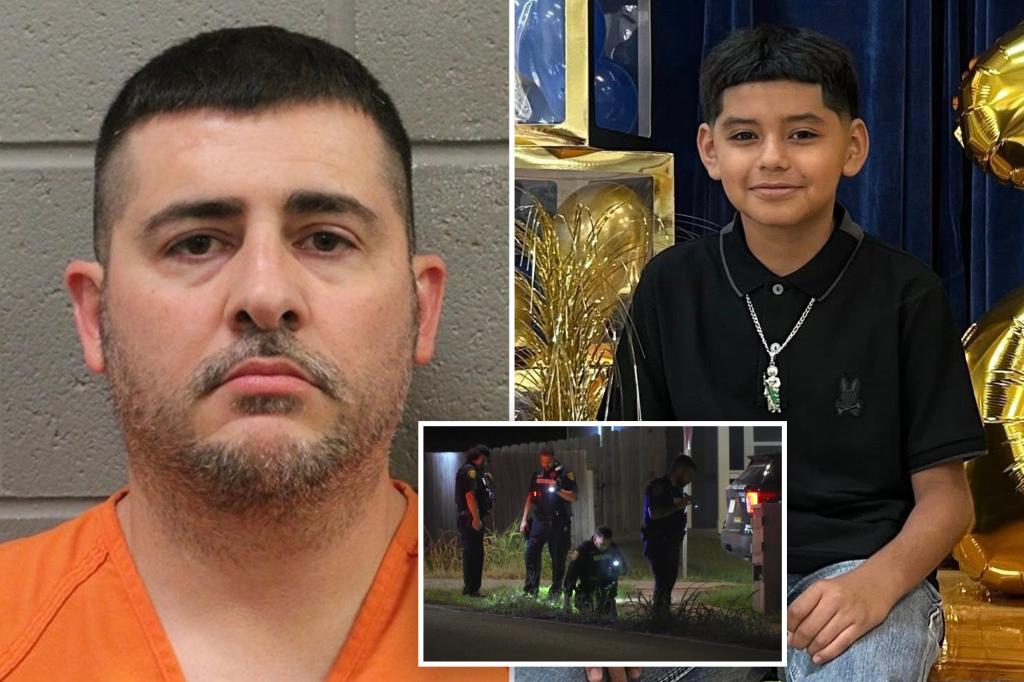Tragedy Strikes: 11-Year-Old Boy Killed in Doorbell Prank Gone Wrong
In a heartbreaking case that has shocked a Houston community, what began as a childhood prank ended in unimaginable tragedy when 11-year-old Julian Guzman was fatally shot while playing a game of “ding-dong ditch” with friends. The incident has resulted in 42-year-old homeowner Gonzalo Leon Jr. facing capital murder charges, as authorities reveal disturbing details about what they describe as a calculated attack on a child.
The events unfolded on a Saturday night in east Houston when Julian and his friends were engaging in the decades-old prank that has recently seen renewed popularity on TikTok. The game involves ringing a doorbell or knocking on a door before running away without being seen—a harmless mischief that children have participated in for generations. According to investigators, the children had rung Leon’s doorbell multiple times that evening. Rather than responding with annoyance or even calling authorities, prosecutors allege Leon made the devastating decision to arm himself and wait for the children to return. Court records indicate that Julian’s cousin witnessed Leon emerging from a gate by his house and making his way to the street, where he fired once at the ground before shooting directly at the fleeing boys. Julian managed to run about a block away before collapsing, with his cousin attempting to drag him to safety. Despite being rushed to a nearby hospital, the young boy died from his injuries.
“This was someone brutally murdering an 11-year-old simply because they were mad,” Harris County District Attorney Sean Teare told local media. “We have a little boy who didn’t even have a chance to get his life going yet, struck down for nothing.” The gravity of the situation became even more apparent when authorities searched Leon’s home and discovered an arsenal of more than twenty firearms, including rifles, long guns, and handguns. What makes the case particularly disturbing is that Leon’s own young son was reportedly home at the time of the shooting, adding another layer of tragedy to an already devastating situation. “He just shot him down in the street and went about his business,” Teare added. “What you can never do is discharge your firearm out of anger, ever. When things like that happen, tragedies like this occur.”
The legal response to this case has been swift and severe. Though Leon was initially detained for questioning and released, a SWAT team arrested him days later, and he was originally charged with murder. However, as investigators uncovered evidence suggesting Leon had deliberately waited for the children to return, prosecutors upgraded the charge to capital murder—the most serious murder charge possible in Texas. This elevated charge reflects the belief that the crime was especially heinous or egregious, surpassing the severity of a typical homicide. In Texas, which does impose capital punishment, this upgraded charge potentially makes Leon eligible for the death penalty. As of the latest reports, Leon has not provided a statement to investigators, and prosecutors announced their intention to request a $1 million bond at his scheduled hearing.
The community’s reaction to Julian’s death has been one of profound grief and outrage. This case has ignited conversations about proportional response, gun ownership responsibility, and the protection of children. What stands out in this tragedy is the extreme disconnect between the nature of the children’s action—a harmless, if annoying, prank—and the lethal response it provoked. Child development experts often note that pranks like “ding-dong ditch” are typical exploratory behaviors for pre-teens who are testing boundaries and enjoying the thrill of minor mischief without causing actual harm. Most adults respond to such pranks with irritation or perhaps a stern word if they catch the children, but nothing approaching violence.
This case forces a difficult reckoning with questions about anger management, conflict resolution, and the responsibilities that come with gun ownership in America. Many community members have pointed out that even if someone is repeatedly annoyed by neighborhood children, there are numerous appropriate channels to address such issues—from speaking with parents to contacting non-emergency police lines. The extreme escalation in this case has left a family mourning an 11-year-old boy who will never grow up, friends traumatized by witnessing violence, and a community grappling with how such a minor incident could lead to such devastating consequences. As Julian’s family prepares to lay him to rest and the legal process against Leon moves forward, the case serves as a stark reminder of how quickly anger can lead to irreversible tragedy and the importance of teaching and modeling appropriate responses to life’s minor annoyances, especially when children are involved.
The death of Julian Guzman represents not just the loss of a young life but also a failure of adult responsibility and community safety. As prosecutors prepare their case and the defendant faces justice, the community is left to mourn a child whose only crime was participating in a childish prank, and to reflect on how society can better protect its most vulnerable members from disproportionate responses to minor transgressions. Julian will be remembered not just as a victim of senseless violence, but as a child whose death should prompt serious conversations about conflict resolution, gun safety, and the protection of childhood innocence in communities across America. In his memory, perhaps adults can learn to respond with patience rather than anger, with words rather than weapons, and with the understanding that children deserve the chance to learn from minor mistakes without paying the ultimate price.


